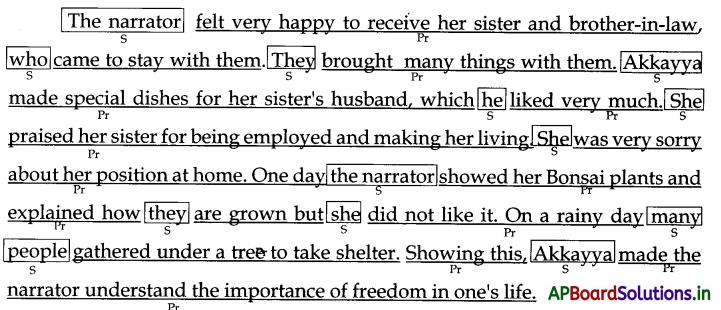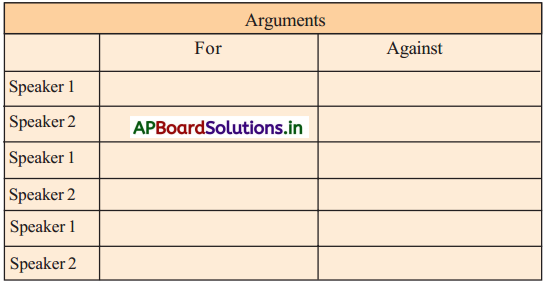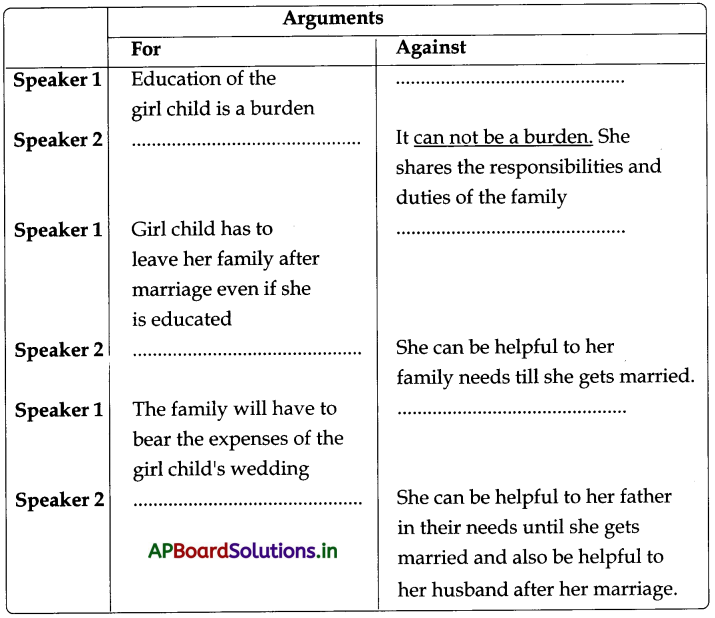Telangana SCERT TS 8th Class English Study Material Pdf Unit 7B Bonsai Life Part 2 Textbook Questions and Answers.
TS 8th Class English Guide Unit 7B Bonsai Life Part 2
I. Complete the statements giving more than one reason.
Question 1.
Girls should be educated like boys because…
Answer :
a) They should earn their own livelihood like men.
b) They shouldn’t lead a dependent life.
c) They should lead a dignified life without depending on others.
Question 2.
Fully grown trees are more useful because…
Answer :
a) They give shade and shelter to the people who settle under them.
b) They provide food in the form of fruits and seeds.
c) They control pollution.
![]()
II. Answer the following questions.
Question 1.
Why was Akkayya perplexed?
Answer :
Akkayya was perplexed at the laughter of her sister (the narrator). She questioned her sister (the narrator) why she had planted the turai and pomegranate trees in flower pots. She even felt sorry for the trees. This made the narrator laugh at the ignorance of her sister regarding bonsai (trees) art. The laughter confused (perplexed) her sister.
Question 2.
How is a bonsai reared?
Answer :
Bonsai is reared in flower pot. It has to be tended very carefully. Its branches should be cut often, pots need to be changed now and then. It should be trimmed into a small sized tree. It needs more attention and care.
Question 3.
What similarities do you notice between the Bonsai tree and the house wife ?
Answer :
Bonsai tree is reared in flower pots. House – wives are always confined to their work behind the doors. Bonsai trees can’t bear even the slightest irritation caused by the weather. House – wives are also very sensitive in dealing with problems in their life.
Question 4.
What made the narrator feel the urge to free the Bonsai?
Answer :
The narrator realized the importance of trees in providing shade and shelter to people. She felt that trees should be let to grow freely in the open space. They can fulfil their purpose of creating ecological balance in nature. This feeling urged her to free the Bonsai.
![]()
Question 5.
What is the central theme of ‘Bonsai Life’?
Answer :
Bonsai life is a restricted life without any freedom. A bonsai is to be tended very carefully without any exposure. There is no dignity in it. This sort of bonsai life is beautifully depicted in the story through the women characters. It focuses the life style of women and how it is suppressed by the prejudices of men and society as well.
III. Make a list of activities done by a homemaker and a working woman.

Answer:
| Homemaker | Working Woman |
| 1) taking care of cattle. | 1) taking care of children. |
| 2) taking care of children. | 2) attending household chores. |
| 3) growing vegetables in the garden. | 3) meeting the demands of people both at home and at office. |
| 4) attending to all sorts of household chores. | 4) doing office work. |
| 5) helping family members even in the farms. | 5) balancing office work and work at home. |
![]()
IV. Put a tick (✓) mark against the most appropriate meaning for the phrases given below.
Question 1.
‘… to keep the washerman’s account’ means
a) to take care of household work.
b) to count clothes and pay money
c) to maintain the washerman’s account.
Answer:
a) to take care of household work. (✓)
Question 2.
‘… uphill task’ means
a) high quality work.
b) a difficult job.
c) working on a hill.
Answer:
b) a difficult job. (✓)
Question 3.
‘…… grass is greener on the other side’ means
a) the grass on this side is green.
b) others are as good as we are.
c) others are in a better position than us.
Answer:
c) others are in a better position than us. (✓)
![]()
Question 4.
‘…like a scorpion under a slipper’ means
a) killing a scorpion with a slipper.
b) being guided and controlled.
c) feeling totally suppressed.
Answer:
c) feeling totally suppressed. (✓)
Vocabulary :
I. Look at the phrasal verb underlined in the following sentence.
“I feel like giving it up. (give up).
What does it mean?
‘Give’ is a verb and ‘up’ is a preposition. Such combinations are called phrasal verbs. A phrasal verb normally gives a meaning different from the meaning of its parts.
‘Give up’ means ‘to stop doing something’.
Refer to a dictionary and find out the meaning of some more phrasal verbs beginning with ‘give’ and ‘look’.
give in = ________
give out = ________
give away = ________
look after = ________
look up = ________
look into = ________
Answer :
give in = to agree finally after refusing for sometime
give out = stop working, emit
give away = giving without asking
look after = to take care of
look up = to become better
look into = to examine the facts
![]()
Use the above phrasal verbs in your own sentences.
Answer:
1. At last his father gave in to buying a new bike.
2. After running a few kilometres, his legs gave out.
3. The shop is giving away a sample pack to every customer.
4. Children ought to look after their parents when they grow up.
5. Our financial position is looking up at last.
6. We are looking into your problem. You will get the solution soon.
II. Look at the simile in the following sentence.
Without it, she will have to live under her husband’s thumb ‘like a scorpion under
a slipper’.
The life of a homemaker is compared to a scorpion under a slipper. When we compare two things, we often use the word ‘like’.
Here are a few more examples of similes.
1. He roars like a lion.
2. They eat like wolves.
A. Look at the following similes.
a) bright like a full moon.
b) sleep like a log
c) eat like a bird
d) beautiful like a rose
e) sweet like honey
Now write five sentences using the above similes.
1. Cleopatra’s face looks bright like a full moon.
2. After the heavy meal we shouldn’t sleep like a log.
3. We should eat like a bird to reduce our weight.
4. Her face is beautiful like a rose.
5. Mahima’s words are sweet like honey.
![]()
III. Make some idioms from the words in boxes and use them in your own sentences, one is done for you.
An idiom is a phrase similar to the phrasal verbs you have learnt in previous class.It is difficult to guess the meaning of an idiom by looking at the individual words.


Answer :
| Idiom | Sentence |
| thorn in flesh | The price rise has been a thorn in flesh for the Government for a couple of years. |
| sore in back foot | I cannot win against him. I have a sore in the back foot. |
| on the top of the work | The members of our team are on top of the world as they won in the finals. |
| cat on the wall | He never expresses his opinions easily. He always tries to be on safe side. He is a cat on the wall. |
Grammar:
I. Read the sentences.
1. ![]() grew accustomed to village life.
grew accustomed to village life.
2. ![]() went into the kitchen.
went into the kitchen.
The words in circles are subjects. The words underlined are predicates.
![]()
II. Circle the subjects and underline the predicates.
1. The girls danced.
2. The dark clouds filled the sky.
3. Shiva drove a silver Toyota.
Answers:

III. Identify subjects and mark them with ▭ and underline predicates in each of the sentence in the following paragraph.
The narrator felt very happy to receive her sister and brother-in-law, who came to stay with them. They brought many things with them. Akkaya made special dishes for her sister’s husband, which he liked very much. She praised her sister for being employed and making her living. She was very sorry about her position at home. One day the narrator showed her Bonsai plants and explained how they are grown but she did not like it. On a rainy day many people gathered under a tree to take shelter. Showing this, Akkaya made the narrator understand the importance of freedom in one’s life. 
Writing :
Look at the following poster.

List the features of this poster.
E.g. Who has issued the poster? What is it about?
The date, time, the place of the event, layout nature of the sentences.
Features list:
- The poster has been issued by TS DWACRA, Arunodaya building, Nampally, Hyderabad.
- The exhibition is from 15 th to 25 th October.
- Inauguration Time 4 p.m on 15 October.
- The place of the event is People’s Plaza, Necklace Road, Hyderabad.
- The heading of the poster is in bold letters.
- The explanation regarding Exhibition is in italics.
- Side headings are also in bold letters to focus and to draw the attention.
- The important points are written in the circle in bold letters to draw the attention of the people.
![]()
I. Now, make a poster based on the information given below.
1. Issuing authority: Telangana Arts and Crafts Society , Nizamabad.
2. Event: Dance performance by Aarthi.
3. November 14.
4. Chief Guest : Honourable Chief Minister of Telangana.
5. Venue : Rajiv Gandhi Auditorium, Khaleelwadi, Nizamabad.

Listening Passage :
Education of the Girl Child Is a Burden
Speaker 1: Respected Chairperson, honourable Judges and dear friends, I stand here to express my views for the motion, ‘Education of the girl child is a burden’. I would like to state that the education of the girl child is indeed a burden. In a poor family the main concern for the head of the family is to provide food, clothing and health to all the members. Most of their resources are used for these priorities. Later, when they think of education, the first preference goes to the male child as he would be growing to be the breadwinner of the family, whereas the girl would leave the family one day. So, I feel that educating the girl child is a burden.
Speaker 2: Respected chairperson, honourable Judges and dear friends! My knowledgable opponent is of the opinion that the education of the girl child is a burden. May I ask how education of the girl could be a burden when she is an equal partner in sharing the responsibilities and duties? If given a chance, she will be sharing the burden of the family at least till she gets married. So, I strongly oppose the motion.
Speaker 1 : When my opponent feels that the girl child would leave the family one day after marriage, can’t we agree that it is a waste of money to educate a girl child? Instead, the families can save the money to bear the expenses of her wedding. Yes, surely the girl can reduce the burden not by earning after education but by managing the household work. As her duty in the later part of life is to look after the family and children, she better gets practice in the same. If she is away from home for longer periods, it would be an additional burden on the family.
Speaker 2: My friend said, the future of the girl child is to look after the family and children. Haven’t such traditional gender roles led to inequalities in society? I strongly feel that an educated girl can render financial assistance to the father and later to the husband. My dear friend, it is education that will bring about a change in the attitude of people towards the role of women. Indeed, it is rightly said: ‘If you educate a man, you educate an individual. If you educate a woman, you educate a nation’.
Listen to a debate on the topic’Education of the Girl Child is a Burden’ and answer the questions that follow.
Now, complete the table based on the information you’ve just listened to:

Answer :

Bonsai Life (Part – II) Summary in English
The narrator of the story bothered a lot about her sister’s life in the village. She remembered how her father did not allow her sister to continue her studies. When the narrator found her sister was worrying a lot remembering her past, she diverted the topic. She took her to the outside of their house. There her sister noticed the turai and pomegranate trees growing in flower pots. She was surprised and asked the narrator why she unnecessarily stunted the plants keeping them in flower pots. The narrator laughed and explained to her the art of bonsai in which she was an expert. The narrator even gave a brief lecture on bonsai art boasting about herself. But her sister did not appreciate her.
The narrator was distressed as if the entire art she had learnt had come to nought. Suddenly a desert storm began to rage. As it became in-secure, the narrator hurriedly dragged all the bonsai tree pots behind the doors. Looking at the narrator’s activity, her sister laughed. Later she asked the narrator to look through the window. The narrator noticed that there were some people under the shade of turai tree getting shelter there. The narrator’s sister explained the importance of turai tree and how it was providing shelter to the people.
She made the narrator realize that the narrator was unnecessarily taking a lot of care of the bonsai trees keeping them in the flower pots. The narrator understood that trees should be allowed to grow in the open space so as to be useful to people. They shouldn’t be imprisoned in flower pots like birds in cages.
Symbolically the writer explained that the life of woman in the society was like bonsai trees. Finally she concluded that women shouldn’t be brought up like bonsai trees. They should enjoy the freedom of life being respectable persons in the society like men.
Original title: Bonsai Bratukulu by Abburi Chayadevi.
Translated from Telugu by Alladi Uma and M Sridhar.
![]()
About the Author :
Abburi Chayadevi is a well known feminist writer born in 1933. She has written many short stories and essays. She was awarded the Central Sahitya Akademi in 2005. In her works, she elucidates women’s life and their feelings.
Glossary :
1. adept (adj) : a natural ability to do something skilfully Usage: Sanaa is very adept in writing poetry.
2. drudgery (n) : hard, boring work
3. stunted (v): prevented from growth
4. perplex (v) : confuse
Usage: The student was perplexed at the difficult question put by the teacher.
5. canopy (n) : a cover fixed over something for shelter
6. squall (n) : a strong wind
7. rage (n): come with force
8. respite (n): a short period of rest
Usage : Now-a-days the students are confined to studies without any respite.
9. nought (n) : nothing / zero
![]()
Additional Meanings :
10. trimming : cutting the branches to bring beauty
11. dragged : move heavily
12. stunned : surprised
13. crept : crawled
14. bowed : bent the head
15. tended : took care of
16. urged : strongly suggested
17. distressed : felt sorry, without hope
18. turayi : a kind of tree
19. disheartened : despaired